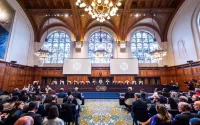15 September 2004Brian Knowlton
Despite a dramatic flare-up of violence in Iraq that has produced a long list of American military casualties and even longer lists of Iraqi casualties in scores of daily bombings, reaction in the United States seems muted and the Kerry campaign appears to have derived little gain from the issue.In part, this may reflect the success of administration efforts, led by Vice President Dick Cheney, to convince Americans that the war in Iraq is a war against terrorists, that blood spilled there will ultimately make the United States safer and that there is thus no alternative but to persist. Televised scenes from Iraq of mounting chaos could change that calculus. But in recent weeks, Americans seem not to have focused on the news from Iraq, appearing more preoccupied with reports on the wave of hurricanes that have threatened Florida.President George W. Bush on Tuesday addressed a National Guard group in Las Vegas, and paid tribute to those fighting in Iraq and Afghanistan. "In these crucial times," he said, "our commitments are kept by the men and women that wear our uniform."He did not react directly to the latest paroxysm in Iraq or to suggestions that matters there may be seriously deteriorating. Earlier, in a rally near Denver, supporters applauded as Bush underlined the notion that action overseas could prevent attacks on the homeland. "We're staying on the offensive," he said. "We'll strike the terrorists abroad so we will not have to face them at home."Even Bush's Democratic rival, Senator John Kerry, has not made the issue a centerpiece. He devoted the bulk of a speech Tuesday in Milwaukee to domestic issues like health care and Social Security, where polls show him with greater support than he holds on terror and national security matters."Things are getting worse," Kerry said about Iraq, in a statement responding to Bush's speech. "It was wrong for America to go it alone, and now every American is paying the price."Earlier, in a prepared text, Kerry repeated his recent line that "of all George Bush's wrong choices, the most catastrophic choice is the mess he's made in Iraq." Kerry said again that had he been president, "I would have done almost everything differently" there.But Democrats have had little luck in seeking to separate, in voters' minds, the issue of the fight against terrorism, where Bush enjoys strong backing, from the traumas flowing from the war that he launched in Iraq.A few months ago, amid intense combat and the prisoner-abuse scandal, Bush and Kerry were running about even in opinion polls on the question of who would better handle the situation in Iraq.But a Gallup Poll in early September, which followed weeks of negative publicity questioning Kerry's Vietnam War record, showed Bush leading Kerry by 54 percent to 41 percent on that question.Bush's lead on the question, apparently lifted by the Republican convention in New York, swelled even despite extensive publicity about the 1,000-death milestone among U.S. troops in Iraq.Analysts, and some administration supporters, noted that the number is still small compared to previous wars. And in a country approaching 300 million people, where soldiers come disproportionately from rural areas and small towns, most Americans do not personally know anyone who has died in the war.Surveys show that the Al Qaeda-Iraq link has taken root in many voters' minds. Cheney still asserts such a connection, and Bush less directly suggests one, though the national commission on Sept. 11 terror attacks said it had found evidence only of isolated contacts.Cheney said Friday that Iraq "had provided sanctuary and support for terrorists in the past" and that "there was a relationship with Al Qaeda."Kerry's running mate, Senator John Edwards of North Carolina, said Sunday that Cheney was irresponsibly clouding the issue of a supposed link."From this day forward, this administration should never suggest that there is" a link, Edwards said. "Vice President Cheney should not say the kinds of things he said Friday, and the president should not mislead the American people by implying there is a connection between the attacks of Sept. 11 and Saddam Hussein."Bush has, of late, emphasized U.S. efforts to rebuild Iraq and to establish a stable democracy there. He has said that this will not be easy, but glossed over the complexities of how to reach that objective. "We will stay the course so that they can develop an army and police force of their own so they can defend themselves," Bush said Monday, referring to both Iraq and Afghanistan. "We're going to get - get the job done as quickly as possible, and then our troops will come home with the honor they've earned. And the world will be better off."Bush strategists have said for months that they do not expect U.S. military deaths to seriously undermine support for the president, so long as the public accepts the underlying rationale for war, considers it winnable and the death toll does not surge dramatically.






